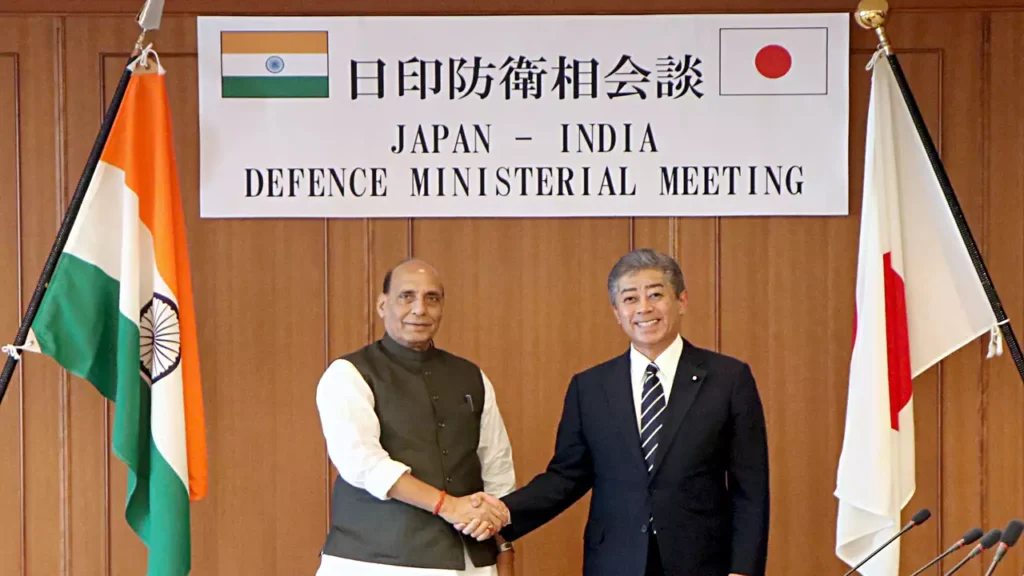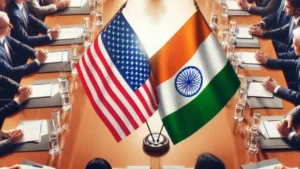India-Japan Maritime Dialogue: Strengthening Strategic Ties and Regional Cooperation

In recent years, India and Japan have emerged as two key players in the Indo-Pacific region, with both nations prioritizing regional stability, maritime security, and enhanced economic cooperation. A pivotal moment in this growing partnership came with the recent India-Japan Maritime Dialogue, held in early April 2025. This dialogue highlighted the shared interests and strategic alignment between the two nations, especially in the context of an increasingly complex and volatile regional security environment.
The dialogue, which took place in New Delhi, focused on issues of maritime security, regional cooperation, and the enhancement of bilateral naval ties. The discussions were part of a broader effort to deepen the India-Japan Special Strategic and Global Partnership, which has been steadily strengthening since its inception in 2000.
Key Discussions and Developments:
Maritime Security and Freedom of Navigation: One of the main highlights of the dialogue was the reaffirmation of both India and Japan’s commitment to ensuring freedom of navigation in the Indo-Pacific. Given the increasing tensions in the South China Sea and the broader Indo-Pacific region, both countries expressed concerns over rising maritime security challenges, including territorial disputes and attempts to exert control over international waters.
The leaders underscored the importance of adhering to international maritime laws, particularly the United Nations Convention on the Law of the Sea (UNCLOS), as a means to uphold a rules-based maritime order. India and Japan’s growing cooperation in maritime security was seen as crucial in the face of increasing challenges posed by other regional powers, notably China, whose actions in the South China Sea and its strategic interests in the Indo-Pacific have raised concerns globally.
Expansion of Joint Naval Exercises: The dialogue also witnessed discussions on the expansion of joint naval exercises between India and Japan. Over the years, the two nations have engaged in regular naval drills, with the most notable being the Malabar Exercise. However, in recent months, both countries have expressed a desire to expand the scope of their military-to-military engagements, including more frequent and comprehensive naval exercises that could also involve other regional stakeholders like the United States and Australia.
The two sides agreed to explore new areas of cooperation in joint maritime surveillance, capacity-building for smaller regional states, and enhancing interoperability between their naval forces. This partnership aligns with the broader goals of the Quad (Quadrilateral Security Dialogue), which consists of India, Japan, the United States, and Australia.
Maritime Infrastructure Development: Another key theme of the dialogue was the development of maritime infrastructure. Japan has been a key partner for India in upgrading its maritime infrastructure, especially in the Indian Ocean region. Japanese expertise in port development and maritime technologies has been instrumental in modernizing India’s ports and coastal facilities.
India’s expanding “SAGAR” (Security and Growth for All in the Region) initiative, which aims to enhance maritime security and economic development in the Indian Ocean, has seen Japan’s active participation. Both nations emphasized the need to further collaborate in building resilient maritime infrastructure, including ports, shipping lanes, and coastal security mechanisms, particularly in the Indian Ocean, a region crucial for global trade and energy flows.
Environmental Cooperation and Maritime Sustainability: The dialogue also saw the discussion of environmental challenges in the maritime domain. Both countries agreed to intensify their cooperation on maritime environmental protection by focusing on sustainable maritime practices. This includes addressing issues such as marine pollution, overfishing, and the protection of marine biodiversity.
As both India and Japan face environmental challenges in their respective maritime territories, they agreed to work together on joint research projects to combat climate change’s impact on marine ecosystems. Japan’s expertise in sustainable maritime technology and India’s commitment to addressing environmental concerns made this a crucial area of collaboration.
Bilateral Economic and Trade Cooperation: A significant portion of the dialogue also touched upon the economic aspects of the maritime relationship. India and Japan’s economic ties have been growing steadily, with Japan being one of India’s major trading partners. The discussions emphasized the need to enhance maritime trade routes, improve shipping connectivity, and explore new maritime trade agreements to promote economic growth.
Japan, as a leader in shipping technology and logistics, has played a crucial role in facilitating trade between India and the rest of the world. In the maritime dialogue, both sides reiterated their commitment to ensuring safe, efficient, and secure trade routes through the Indian Ocean and beyond, with an emphasis on boosting the blue economy, maritime innovation, and investment in infrastructure.
Events Following the Dialogue:
After the dialogue, both countries agreed to establish a permanent working group dedicated to strengthening maritime security and regional cooperation. They also committed to holding annual maritime dialogues to ensure continuous engagement on these crucial issues.
The success of the dialogue was underscored by the signing of a Joint Maritime Security Cooperation Agreement, which lays out clear frameworks for future collaboration, including joint exercises, intelligence-sharing, and the establishment of maritime cooperation centers. The agreement is expected to significantly enhance both countries’ ability to respond to maritime security threats in the Indo-Pacific region.
The India-Japan Maritime Dialogue marked an important milestone in the growing strategic partnership between the two countries. As both nations face evolving security challenges in the Indo-Pacific, their cooperation in maritime security, infrastructure, and environmental protection is more vital than ever. This dialogue not only reinforces the shared commitment of India and Japan to regional peace and stability but also strengthens their partnership in safeguarding the maritime domain in the face of emerging geopolitical dynamics.
With continued collaboration and a focus on innovation, the India-Japan partnership in the maritime space will undoubtedly play a key role in shaping the future of the Indo-Pacific region.



